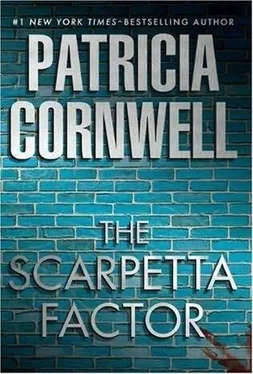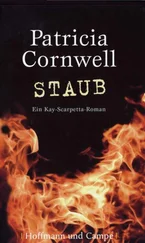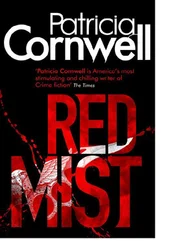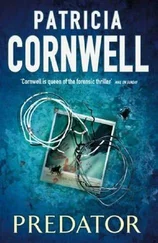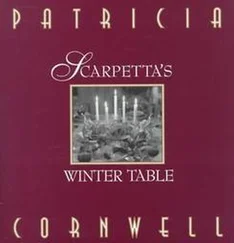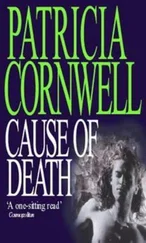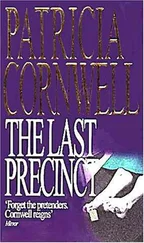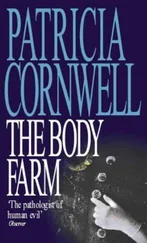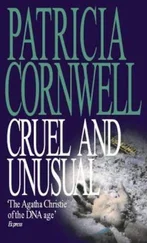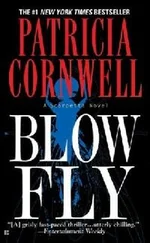“We also don’t know that somebody else didn’t see the same thing Harvey Fahley did,” Benton said, looking at Scarpetta, saying it for her benefit. “Wouldn’t be good if some other witness did the typical thing these days and instead of going to the police went to a news network. I wouldn’t want to be within five miles of CNN or any other media outlet if this detail about the yellow cab has been leaked.”
“I understand,” Scarpetta said. “But whether it has or hasn’t, I’d be concerned that my being a no-show tonight would make matters only worse. Would only escalate the sensational value. CNN knows I’m not going to discuss Toni Darien or Hannah Starr. I don’t discuss active cases.”
“I’d stay clear.” Benton looked intensely at her.
“It’s in my contract. I’ve never had a problem,” she said to him.
“I agree with Kay. I’d conduct business as usual,” said Berger. “If you cancel at the final hour, all it will do is give Carley Crispin something to talk about.”
Dr. Warner Agee sat on the unmade bed inside his small suite of English antiques, the curtains closed to afford him privacy.
His hotel room was surrounded by buildings, eye-to-eye with other windows, and he couldn’t help but think about his former wife and what it was like when he was forced to find his own place to live. He’d been appalled when he noticed how many downtown Washington apartments had telescopes, some decorative but functional, others for serious viewing. For example, an Orion binocular mount and tripod set in front of a reclining chair that didn’t face a river or a park but another high-rise. The Realtor was crowing about the view as Agee peered directly into the condo across the way at someone buck naked, walking around, the drapes not drawn.
What purpose was there for telescopes and binoculars in congested areas of major cities like Washington, D.C., or here in New York unless it was spying, unless it was voyeurism? Obtuse neighbors undressing, having sex, arguing and fighting, bathing, sitting on the toilet. If people thought they had privacy in their own homes or hotel rooms, think again. Sexual predators, robbers, terrorists, the government-don’t let them see you. Don’t let them hear you. Make sure they aren’t watching. Make sure they aren’t listening. If they don’t see or hear you, they can’t get you. Security cameras on every corner, vehicle tracking, spy cams, sound amplifiers, eavesdropping, observing strangers in their most vulnerable and humiliating moments. All it takes is one piece of information in the wrong hands and your entire life can change. If you’re going to play that game, do it to others before they can do it to you. Agee didn’t leave blinds or curtains open, not even during the day.
“You know what the best security system is? Window shades.” Advice he’d been giving his entire career.
Truer words never spoken, exactly what he’d said to Carley Crispin the first time they met at one of Rupe Starr’s dinner parties when she was a White House press secretary and Agee was a consultant who traveled in many orbits, not just the FBI’s. The year was 2000, and what a bombshell she’d been, outrageously attractive, with flaming red hair, edgy, smart, and a catbird when she wasn’t talking to reporters and could say what she really thought. Somehow the two of them ended up in Rupe Starr’s rare-book library, perusing old tomes on a few favorite subjects of Agee’s, the flying heretic Simon Magus and the flying saint Joseph of Cuper tino, who indisputably had the ability to levitate. Agee had introduced her to Franz Anton Mesmer and explained the healing powers of animal magnetism, and then Braid and Bernheim and their theories on hypnosis and nervous sleep.
It was natural that Carley with her journalistic passions would be less interested in the paranormal and more drawn to the bookcase of photo albums, all bound in Florentine leather, the rogues gallery of Rupe’s so-called friends, as Agee referred to the most popular section in the rare-book room. For a long stretch of solitary hours on the third floor of that massive house, Agee and Carley cynically perused decades of pictures, the two of them sitting side by side, pointing out the people they recognized.
“Amazing the friends money will buy, and he thinks they mean it. That’s what I’d find sad if I could bring myself to feel sorry for a multi-fucking-billionaire,” Agee said to someone who trusted no one because she was as amoral and just as much a user as anyone Rupe Starr might ever meet.
Only Rupe never made Carley any money. She was simply an attraction for the other guests, the same thing Agee was. You couldn’t even get an interview at Rupe’s special club without a minimum of a million dollars, but you could be a guest if he liked you and thought you were an amusement of one sort or another. He’d invite you to dinners, to parties, as entertainment for his real guests. The ones with money to invest. Actors, professional athletes, the newest wizards on Wall Street would descend upon the Park Avenue mansion, and for the privilege of making Rupe richer would get to mingle with other luminaries whose commodity wasn’t cash. Politicians, television anchors, newspaper columnists, forensic experts, trial lawyers-it could be anyone in the news or with a good story or two who fit the profile of whomever Rupe was trying to impress. He researched his potential clients to find out what moved them, and then he would recruit. He didn’t have to know you to put you on his B list. You’d get a letter or a phone call. Rupert Starr requests the pleasure of your company.
“Like throwing peanuts to the elephants,” Agee had told Carley on an evening he’d never forget. “We’re the peanuts, they’re the elephants. Heavyweights we’ll never be, even if we live to be as old as elephants, and the unfair irony is some of these elephants aren’t old enough to join the circus. Look at this one.” Tapping his finger on the picture of a ferociously pretty girl staring boldy into the camera, her arm around Rupe. The year written on the page was 1996.
“Must be some young actress.” Carley was trying to figure out which one.
“Guess again.”
“Well, who?” Carley asked. “She’s pretty in a different way. Like a very pretty boy. Maybe it is a boy. No, I think I see breasts. Yup.” Moving Agee’s hand as she turned the page, and her touch startled him a little. “Here’s another one. Definitely not a boy. Wow. Rather gorgeous if you get past her Rambo clothing and no makeup; she’s got a very nice body, very athletic. I’m trying to remember what I’ve seen her in.”
“You haven’t and you’ll never guess.” Leaving his hand where it was, hoping she might move it again. “Here’s a hint. FBI.”
“Must be organized crime if she can afford to be in this Starr-studded collection.” As if human beings were no different than Rupe’s precious antique cars. “On the wrong side of the law, that’s the only FBI connection she could have if she’s filthy rich. Unless she’s like us.” Meaning the B list.
“She’s not like us. She could buy this mansion and still have plenty left.”
“Who the hell is she?”
“Lucy Farinelli.” Agee found another photograph, this one of Lucy in the Starr basement garage, sitting behind the wheel of a Duesenberg, seeming intent on figuring out a priceless antique speedster she wouldn’t hesitate to drive and maybe did on that particular day or some other day when she was in Starr Counting House, counting out her money.
Agee didn’t know. He hadn’t been to the mansion at the same time Lucy had, for the simple reason that Agee would be the last person invited for her entertainment or pleasure. At the very least she would remember him from Quantico, where as a high-school wunderkind she’d helped design and program the Criminal Artifi cial Intelligence Network, what the Bureau simply referred to as CAIN.
Читать дальше
